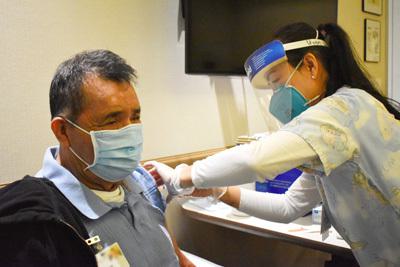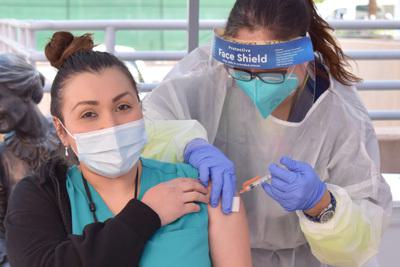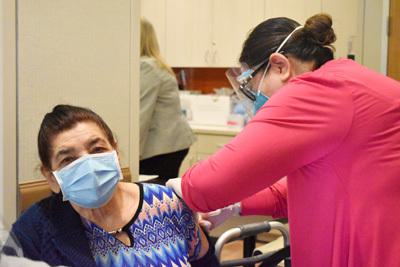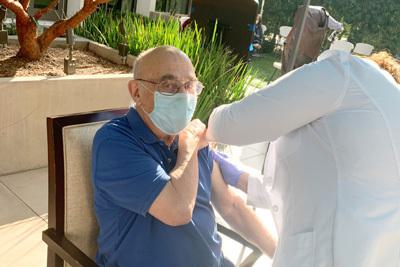Los Angeles Jewish Home Protects Seniors and the Staff Who Care for Them with COVID-19 Vaccine


Los Angeles Jewish Home Protects Seniors and the Staff Who Care for Them with COVID-19 Vaccine
All those eligible have received first dose
Two thousand twenty-one is here, and with the rollout of the COVID-19 vaccine at the Los Angeles Jewish Home, hopes are high that this will be an especially happy—and healthy—New Year.
Within weeks after the arrival of the first vaccine shipment, all eligible Jewish Home residents who elected to do so have already received the first dose, says Noah Marco, MD, the Home's chief medical officer. Staff within the government tier groups have also received the vaccine in large numbers. "It's a significant achievement because immunizing residents and staff is helping to protect all those in our care," Dr. Marco says. "For that reason, I have been encouraging every member of the Jewish Home community to follow a simple mantra: 'Don't hesitate; vaccinate!'"

Among the groups who have received the initial dose are residents and staff directly involved in care or service within the Home's skilled nursing facilities including the Joyce Eisenberg-Keefer Medical Center, the Mark Taper Skilled Nursing Building, the Max Factor Family Foundation Nursing Building, and the Goldenberg•Ziman Special Care Center. Residents and staff of Fountainview at Gonda, Fountainview at Eisenberg Village, and the Newman and Weinberg buildings have also been inoculated, as have staff at the Home's Brandman Centers for Senior Care and Skirball Hospice and Palliative Care.
To date, the vaccine has reached more than 1,900 people across Jewish Home campuses, notes Jewish Home President and CEO Dale Surowitz. "We are doing everything in our power to expedite this process and to make sure it runs safely, smoothly, and efficiently," he says. "Working around the clock, we have developed an aggressive schedule for administering the vaccine, while of course following all government and public health mandates."

Implementing vaccine distribution in such a timely manner has been possible thanks to the Jewish Home's deep bench of talented and dedicated staff. In addition to Dr. Marco, the Home has a team of nurse practitioners and other nursing staff administering the shots. Helping to secure the arrival of the vaccine is Compliance Officer Timothy Carlson, who is in constant contact with the Los Angeles County Department of Public Health (Public Health) and others to coordinate the next shipment of the vaccines to the Home.
Offering the vaccine on-site has enabled the Jewish Home to streamline the process, allowing residents and staff to sign up easily and without any roadblocks. This has helped maximize the number of people receiving the vaccine and has given the Jewish Home a critical head start on reaching everyone who relies on its programs and services. As the largest single-source provider of comprehensive senior healthcare services in Los Angeles, the Home serves nearly 4,000 seniors each year.

The Jewish Home's efforts have received positive media coverage, including major outlets such as CNN.com, California Healthline/Kaiser Health News, and KNX 1070 news radio. Their coverage shows that, while other institutions have struggled with vaccine coordination, the Jewish Home continues to make important headway.
"We are focused on providing protection to every member of the entire Jewish Home family," Dale says, "and our steady progress shows we're well on the way to reaching that goal."
